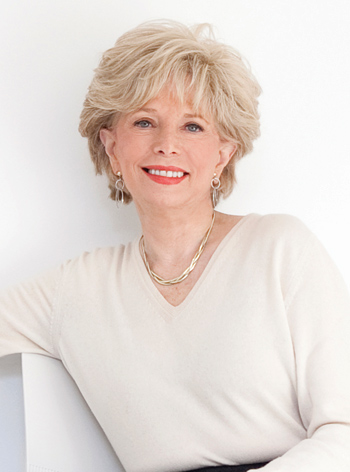3 Questions for Lesley Stahl, Gutsy Grandma

Lesley Stahl earned the reputation of being persistent and insistent by facing world newsmakers with direct questions and a strong point of view. “My job is making sure I got the story,” she says. “I’d call myself tenacious. My mother told me I was born that way.”
Her first book, Reporting Live, was full of her international travels, encounters with world leaders, and revelations about the White House beat. But she surprised herself when her second book revealed the life-changing experience of Becoming Grandma (Blue Rider Press, 2016). About Jordan and Chloe, her two granddaughters, she says, “You rediscover fun and reach a depth of pure loving you have never felt before.” In true Stahl style, the 60 Minutes correspondent investigates how grandmothering changes a woman’s life, interviewing other grandmas, doctors, anthropologists, scientists, and her husband, screenwriter Aaron Latham.
Jeanne Wolf: A book about grandparenting instead of your life as an influential star reporter?
Lesley Stahl: A publisher was trying to persuade me to write a book about 60 Minutes. I knew that was thankless because it would be revealing dirty linen and making enemies. I didn’t want to go there. During lunch I found myself being a typically tedious grandmother talking about my first grandchild, and he said, “That’s your book.” As a reporter who doesn’t talk about myself much, it turned out to be my biggest challenge.
JW: When your daughter, Taylor, was growing up, how did you handle worries about combining motherhood with a career that took you away from home a lot?
LS: My own mother laid a guilt trip on me. But my daughter often says, “Mom, thank God you worked.” We have a great relationship, but if I hadn’t worked, I would have hovered and tried to control her more than I did. I also had a husband who worked at home, something most young mothers don’t have. He loved, loved, loved being a parent. He actually taught me how to be a parent.
JW: You are still in the middle of the wildly changing media. Has the growth of social media and the ability of even presidents to talk directly to the audience changed the kind of journalism that made you famous?
LS: It changes everything dramatically. After network television came cable. Then we got the internet. Now with Twitter, Snapchat, and other ways for leaders to communicate, the messages feel awfully abrupt. Donald Trump and others can put out a tweet and communicate with tens of millions of people without dealing with the press. What do we do? I don’t think anyone has the answer. 60 Minutes shows you that there is an appetite for in-depth reporting. I’m lucky that it’s one of the few places where leaders come to communicate and where audiences still come to listen.
I wonder if we’re just not going to become analytical. We’re going to stand back and write think pieces and I don’t know what it’s going to do to interviewing, which is what I do for a living. I guess that’s why I’m saying, “Boy, here we are. Now what are we gonna do?”
JW: Yes, because the think pieces can be too much like the spouting pundits that we see on television and read every day.
LS: I think that’s going to be where we head. Not just punditry but long, analytical investigative stories, trend pieces. Even interviews have to be rethought. You know, so much is unrevealing – particularly if there’s a time restriction because politicians will filibuster anyway. It’s hard to say where journalism is heading.
What always surprises me is how young people are attracted to this profession. The journalism schools are brimming with brilliant students. I get calls all the time from people asking how someone could break into our world. It surprises me because it’s such an unsettled place.
JW: It’s true. I guess every place in the media is unsettled. We don’t know what’s going to happen. It can be frustrating to figure out. Well, I guess you always did – try to figure out ways to get revelation or get truth?
LS: The joys of my job, and I know I’m lucky, is that 60 Minutes is one of the few places where leaders still want to come to communicate and where the audience also still wants to come to listen and we can’t say that about a lot of other venues but ours is going strong.
JW: It’s interesting that it’s going strong at a time when everyone is saying that you gotta gimmick it up or do everything in very short bites and very short pieces.
LS: That shows you that there is a healthy appetite for long form. Where I say long form, and this too is funny, because real long form is pieces that are like 13 or 14 minutes. Long form used to be three hours! A three-hour or two-hour documentary. Now long form is 15 minutes. That’s funny in itself.
I do think there’s an appetite for depth for a large number of people. We have a huge audience. But it’s always been true that different journalistic organizations will attract eyeballs.
JW: Ideas about the future of news?
LS: The problem in many ways is financial because to mount a research project takes money. The internet can’t always support in-depth stories. A lot of the sites don’t make nearly the kind of money that network television shows did and do. I fret not just about the questions you’re asking – how will journalism survive and communicate – but how will we raise enough revenue to support the smartest kids in the class. All these things are worrisome.
—Jeanne Wolf is the Post’s West Coast editor
A shorter version of this article is featured in the March/April 2017 issue of The Saturday Evening Post. Subscribe to the magazine for more art, inspiring stories, fiction, humor, and features from our archives.